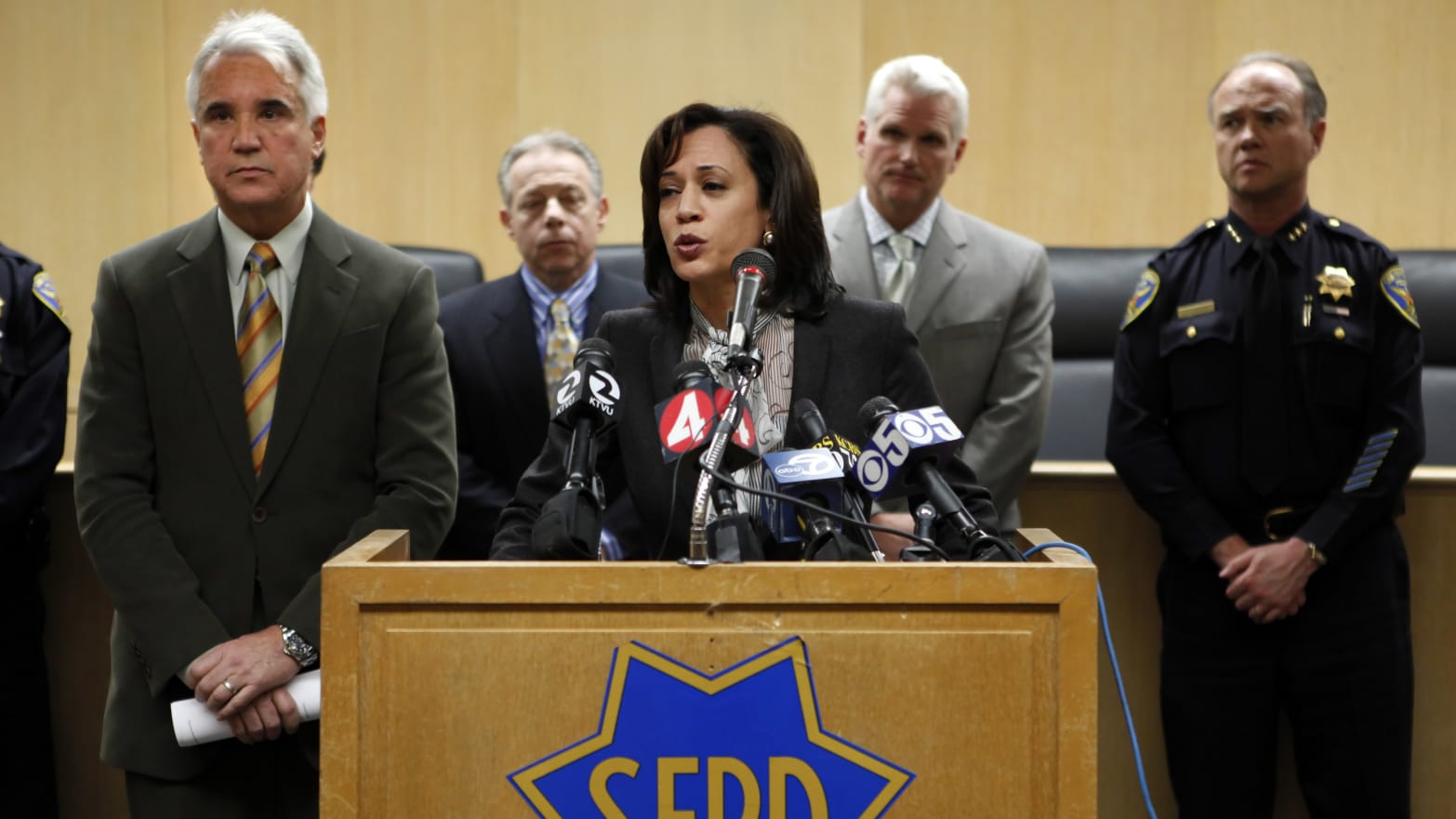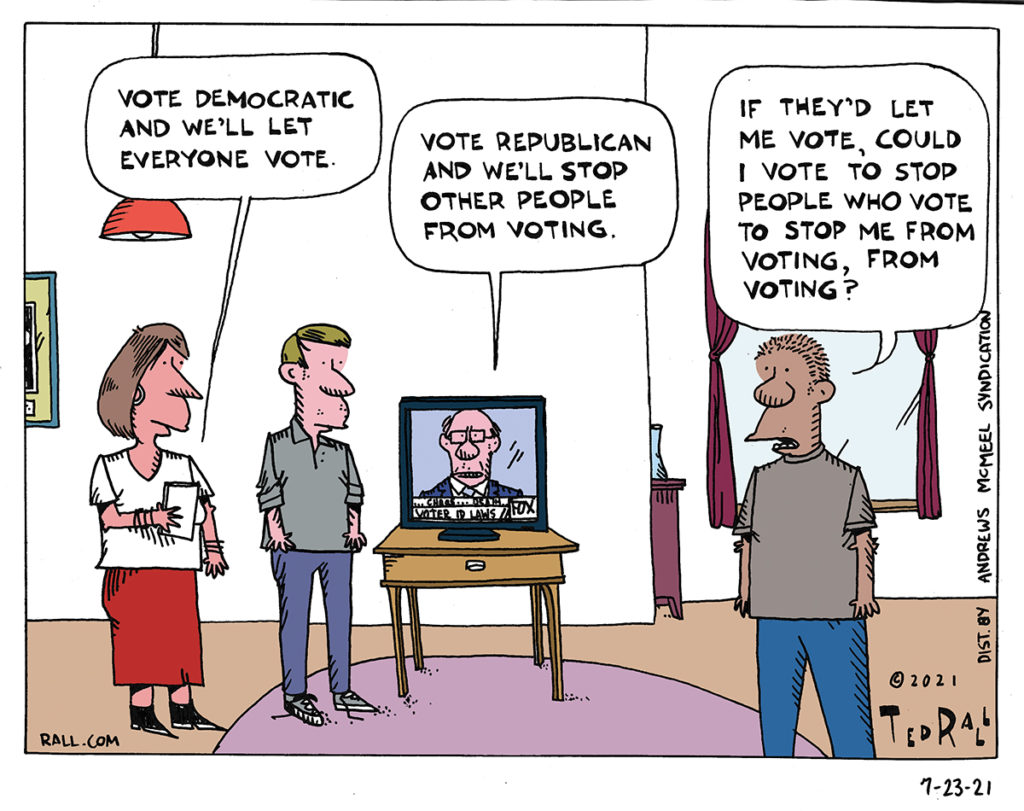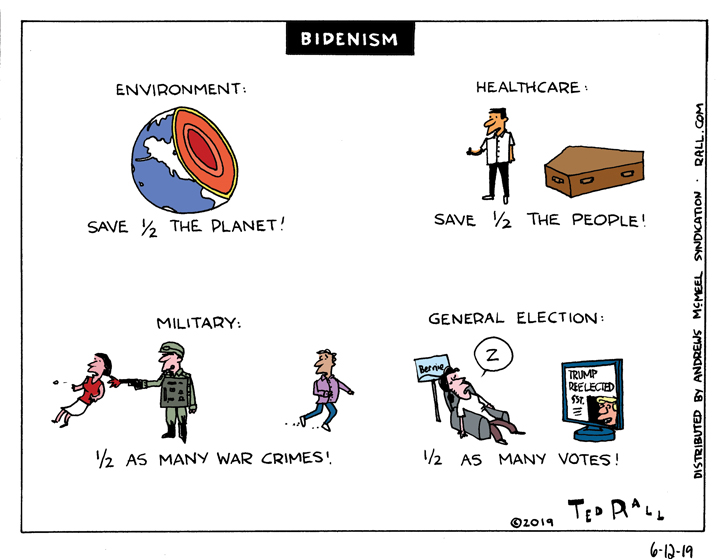
Completely inexplicable, on the other hand, is the Democrats’ immediately creating an “I’m with her” cult of personality for Harris—the same slogan that helped sink Hillary Clinton in 2016 because it violated the #1 rule of politics: the politician is supposed to be with us. Why are gullible Democrats donating at record levels for a candidate who has yet to make a single campaign promise? They’re lining up to volunteer for an incumbent politician who didn’t accomplish a single thing in her current job—no new law attributable primarily to her, no policy initiative she pushed through, no big idea she championed. And they’re overlooking the prosecutor position where she did get stuff done, defending oppressive state policies and leaving behind a trail of broken lives shattered by injustice she helped perpetuate.
We know why: she’s not Trump.
That’s nowhere close to be being good enough. Mainly because it’s a faulty assumption. How do we know she’s better than Trump? Until Harris tells us what she’s for, there is no objective way to compare her to her Republican counterpart.
If a politician wants votes, they should earn them. They must identify our problems and develop policies to address them. They must explain why their solutions are better than those proffered by their opponents. They must defend their record. They must explain their mistakes and explain why they will not repeat them.
Kamala Harris is not doing any of this. And there’s no sign she plans to.
A social media ad distributed July 27th by the Harris Victory Fund says it all: “I am running to be President of the United States. If that’s all you need to hear, then make a donation to fund my campaign today.” [underline hers, not mine] No. It’s not. I need to hear a lot more—and so should you.
Reagan quoted a Russian proverb: “Trust, but verify.” When a leader asks you to trust her without offering any reason to do so, when she asks for a blank check, when citizens willingly suspend skepticism, when those who wish to wait-and-see are shouted down as party poopers in service to evildoers (in this case, Trump), you are observing a key democracy, votes, elections, Kamala Harris, record, promises, policies, Ronald Reagan, Hillary Clinton, blank checkcomponent of fascism: blind trust in The Leader. Jason Stanley, a Yale philosopher, noted: “Truth is required to act freely. Freedom requires knowledge, and in order to act freely in the world, you need to know what the world is and know what you’re doing. You only know what you’re doing if you have access to the truth.”
What is the truth about Kamala Harris? No matter what, her supporters say, she’ll be better than Trump. To which I ask, citing the Boston punk band The Lyres, “How Do You Know?”
This is a tough question to answer.
Which is outrageous.
In a democracy, a citizen should not have to resort to Cold War-style Kremlinology to guess how a candidate for president would govern the country. Yet here we are, casting our votes blindly.
Whatever you think of Project 2025, the Heritage Foundation’s ambitious right-wing wish list for a second Trump Administration, or whether you believe Trump’s claim that he has nothing to do with it, you have to give Republicans credit for having a plan. Voters can read Project 2025 and watch Trump’s rallies and read the GOP platform and decide, as informed free citizens, whether or not they want to vote for a candidate who, more likely than not, would carry out those policies were he to be reelected. We know who Trump is. We know what he’s for.
The same cannot be said of Kamala Harris, a sidelined vice president whose record in the White House is startlingly sparse. New York magazine described the veep last year as “a minor character who has little role in the administration’s domestic and foreign policy.” She only served part of a single term as senator, the highlight of which was her grilling of Supreme Court nominee Brett Kavanaugh. No bill that she co-sponsored ever made it into law.
If anyone owes voters a detailed policy agenda, it’s Harris. Would she be Biden 2.0? Is she a progressive or a corporatist? She’s run as both. Democrats should issue their own version of Project 2025 so we know who and what we’re voting for—or against.
Unless we hold politicians’ feet to the fire, representative democracy is unaccountable and therefore worthless. When we give our votes away without any promises in return, we are reduced to speculation about what they might or may not do. Once elected, they do whatever they want.
They’ve promised us nothing. So they owe us nothing. We are worse, and our system is worse, than people in a corrupt autocracy who sell their votes for money or, as in some countries, kitchen tools. As voters, we are worse than whores. We are sluts of democracy—we give it away for free.
Without specific policy promises, our analysis of Harris must, by necessity, ignore the dictum that past performance is no guarantee of future returns. People change. But if Harris has evolved since her days as a prosecutor—the only period of her career that documents her own actions, in a position where she had wide discretion—we have no way to know that. Is she better than Trump? The only hard data we have is her record as a DA and AG.
That record is pretty bleak. Hers is the portrait of ambitious careerist who marketed herself as a tough-on-crime prosecutor with a view toward setting herself up for a situation like the one in which she finds herself now, running for high office at a time when people are freaked out about street crime. (Bonus! Trump is a convicted felon!) Trouble is, like most self-styled crime fighters, she committed a lot of crimes herself. She violated due process, cheated the rules of evidence, fought to preserve flawed convictions, refused to pay wrongfully-convicted defendants and worked overtime to keep the innocent behind bars by denying DNA tests.
A different kind of evil than Trump’s—but not a smaller kind. What could be more disgusting than using your position as an officer of the court to oppose the interest of justice?
Fortunately for Harris, she can easily lay these skeletons in her closet to rest. She can apologize, say that she has seen the light, and write up a credible plan for criminal justice report that shows she has changed her views.
Hopefully we’ll see something before Election Day.
(Ted Rall (Twitter: @tedrall), the political cartoonist, columnist and graphic novelist, co-hosts the left-vs-right DMZ America podcast with fellow cartoonist Scott Stantis. His latest book, brand-new right now, is the graphic novel 2024: Revisited.)


